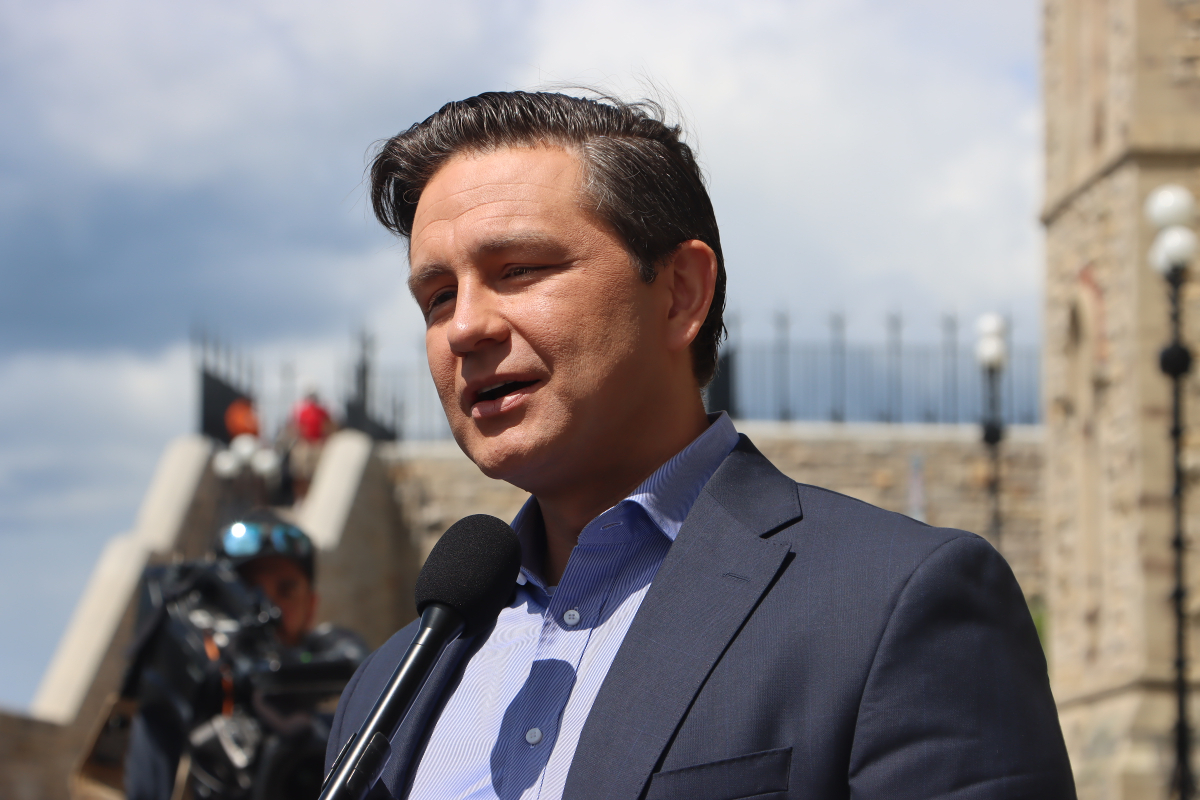Let’s cut straight to the chase, folks. Is Pierre Poilievre French? If you’ve been scrolling through social media or following political debates, this question might have popped up more than once. And honestly, it’s a valid query. But before we dive deep into the answer, let’s set the stage. Pierre Poilievre is one name that’s been making waves in the political arena, and for all the right reasons. His background, his policies, and his persona have sparked curiosity worldwide, not just in Canada where he’s from.
Now, when we talk about whether Pierre Poilievre is French, we’re not just asking about his nationality. We’re also exploring his cultural roots, his heritage, and how those elements shape his identity. And trust me, this isn’t just a random trivia question. It’s a deep dive into the complexities of identity and how it influences political figures.
So, buckle up because we’re about to embark on a journey that’s going to answer all your burning questions about Pierre Poilievre and his French connection. And by the end of this, you’ll not only know the answer but also understand why it matters in today’s globalized world.
Here’s a quick table of contents to help you navigate through this article:
- Biography
- Cultural Heritage
- Nationality and Identity
- Political Career
- Language and Communication
- Relevance in Modern Politics
- FAQs
- Conclusion
Biography: Who is Pierre Poilievre?
Before we tackle the big question, let’s first get to know the man behind the name. Pierre Poilievre is a Canadian politician who has been making headlines for his outspoken views and dynamic leadership style. Born on December 11, 1979, in Ottawa, Ontario, Poilievre grew up in a family deeply involved in public service.
His early life was marked by a strong sense of civic duty, which eventually led him to pursue a career in politics. After studying political science at the University of Ottawa, he began his political journey, which has seen him rise through the ranks to become one of the most influential voices in Canadian politics.
Here’s a quick glance at his personal details:
| Full Name | Date of Birth | Place of Birth | Profession |
|---|---|---|---|
| Pierre Poilievre | December 11, 1979 | Ottawa, Ontario, Canada | Politician |
Cultural Heritage: The Roots of His Identity
Now, let’s talk about the elephant in the room – is Pierre Poilievre French? To answer that, we need to look at his cultural heritage. While Poilievre was born and raised in Canada, his last name might give you some clues about his ancestry. The name “Poilievre” is of French origin, which suggests that his family has roots in France.
But here’s the twist – being of French descent doesn’t automatically make someone French. In Canada, especially in regions like Quebec, French heritage is common, but it doesn’t define nationality. So, while Poilievre’s family might have French roots, his identity is firmly rooted in Canadian soil.
Nationality and Identity: What Defines Pierre Poilievre?
When we talk about nationality, things get a little more complicated. Pierre Poilievre is a Canadian citizen, and that’s what defines him politically and legally. However, his French heritage plays a significant role in shaping his cultural identity.
Here are a few points to consider:
- His last name, Poilievre, is of French origin.
- He speaks fluent French, which is one of Canada’s official languages.
- His family background includes French ancestry, but his upbringing was in Canada.
So, while he has French roots, his nationality is Canadian through and through.
Language and Communication: The Lingua Franca of Politics
One of the reasons people might ask if Pierre Poilievre is French is his proficiency in the French language. In Canada, being bilingual is not just a skill; it’s a necessity, especially in politics. Poilievre’s ability to communicate effectively in both English and French has been a significant asset in his career.
But here’s the deal – speaking French doesn’t make someone French. It’s about identity, culture, and nationality. Poilievre’s fluency in French is a testament to his adaptability and commitment to representing all Canadians, regardless of their linguistic background.
Political Career: Where Does French Heritage Fit In?
Pierre Poilievre’s political career is a testament to his leadership skills and his ability to connect with diverse audiences. As a member of the Conservative Party of Canada, he has been a vocal advocate for fiscal responsibility and individual freedoms. His policies often reflect the values of his French-Canadian heritage, but they are tailored to meet the needs of modern Canada.
Here are some highlights of his political journey:
- Served as the Minister of State for Democratic Reform from 2013 to 2015.
- Became the Minister of Employment and Social Development in 2015.
- Currently serves as the Leader of the Conservative Party of Canada.
Throughout his career, Poilievre has embraced his French heritage while staying true to his Canadian identity. It’s a delicate balance, but one he manages with ease.
Relevance in Modern Politics: Why Does It Matter?
In today’s globalized world, identity is more complex than ever. Questions like “Is Pierre Poilievre French?” highlight the importance of understanding cultural heritage and its impact on political leadership. Poilievre’s ability to connect with people from diverse backgrounds is a testament to his adaptability and openness.
Here’s why it matters:
- It showcases the diversity of Canadian society.
- It highlights the importance of cultural heritage in shaping identity.
- It demonstrates how personal history can influence public policy.
As we navigate the complexities of modern politics, understanding these nuances is crucial for building a more inclusive and representative society.
Language and Communication: Bridging the Divide
Language is a powerful tool, and Poilievre’s fluency in French has helped him bridge the divide between different communities in Canada. By speaking both official languages, he can communicate directly with a wider audience, ensuring that his message reaches everyone, regardless of linguistic barriers.
But here’s the kicker – language is just one aspect of identity. While Poilievre’s ability to speak French is impressive, it’s his actions and policies that truly define him as a leader.
Impact on Policy: How French Heritage Influences Decision-Making
Poilievre’s French heritage has undoubtedly influenced his approach to policy-making. His understanding of cultural diversity and the importance of inclusivity has shaped his stance on various issues, from economic reform to social justice. By embracing his roots, he has been able to craft policies that resonate with a broad spectrum of Canadians.
Here are a few examples:
- Advocating for bilingual education in schools.
- Supporting policies that promote cultural exchange and understanding.
- Encouraging dialogue between different linguistic communities.
These initiatives not only reflect his personal values but also demonstrate his commitment to building a more unified Canada.
Relevance in Modern Politics: The Bigger Picture
As we’ve seen, the question of whether Pierre Poilievre is French is more than just a matter of nationality. It’s about identity, heritage, and the complex interplay between personal history and public policy. In a world where borders are becoming increasingly blurred, understanding these dynamics is crucial for effective leadership.
Poilievre’s ability to navigate these complexities while staying true to his Canadian identity is a testament to his leadership skills. It’s a reminder that in politics, as in life, it’s not just about where you come from but where you’re going that matters.
Challenges and Opportunities: Navigating the Future
As Poilievre continues his political journey, he faces both challenges and opportunities. The global political landscape is constantly evolving, and leaders must be adaptable to remain relevant. By embracing his French heritage while staying grounded in Canadian values, Poilievre is well-positioned to meet these challenges head-on.
Here’s what the future might hold:
- Continued advocacy for fiscal responsibility and individual freedoms.
- Expansion of policies that promote cultural exchange and inclusivity.
- Greater emphasis on bridging linguistic and cultural divides.
With his unique blend of French heritage and Canadian identity, Poilievre is poised to make a lasting impact on the political landscape.
FAQs: Your Burning Questions Answered
Still have questions? Here are some common queries about Pierre Poilievre:
- Is Pierre Poilievre French? – No, he is Canadian, but he has French heritage.
- Does he speak French? – Yes, he is fluent in both English and French.
- What party does he belong to? – He is a member of the Conservative Party of Canada.
- What are his main policies? – He focuses on fiscal responsibility, individual freedoms, and cultural inclusivity.
These answers should clear up any confusion and give you a better understanding of who Pierre Poilievre is and what he stands for.
Conclusion: Where Does Identity Meet Politics?
In conclusion, the question of whether Pierre Poilievre is French is more complex than it seems. While he has French heritage, his identity is firmly rooted in Canadian soil. His ability to embrace his roots while staying true to his Canadian values is a testament to his leadership skills and adaptability.
As we move forward in an increasingly interconnected world, understanding the nuances of identity and heritage will become even more important. Poilievre’s journey serves as a reminder that in politics, as in life, it’s not just about where you come from but where you’re going that matters.
So, the next time someone asks, “Is Pierre Poilievre French?” you’ll know the answer – and the story behind it. And if you found this article helpful, don’t forget to share it with your friends and leave a comment below. Together, let’s keep the conversation going!

